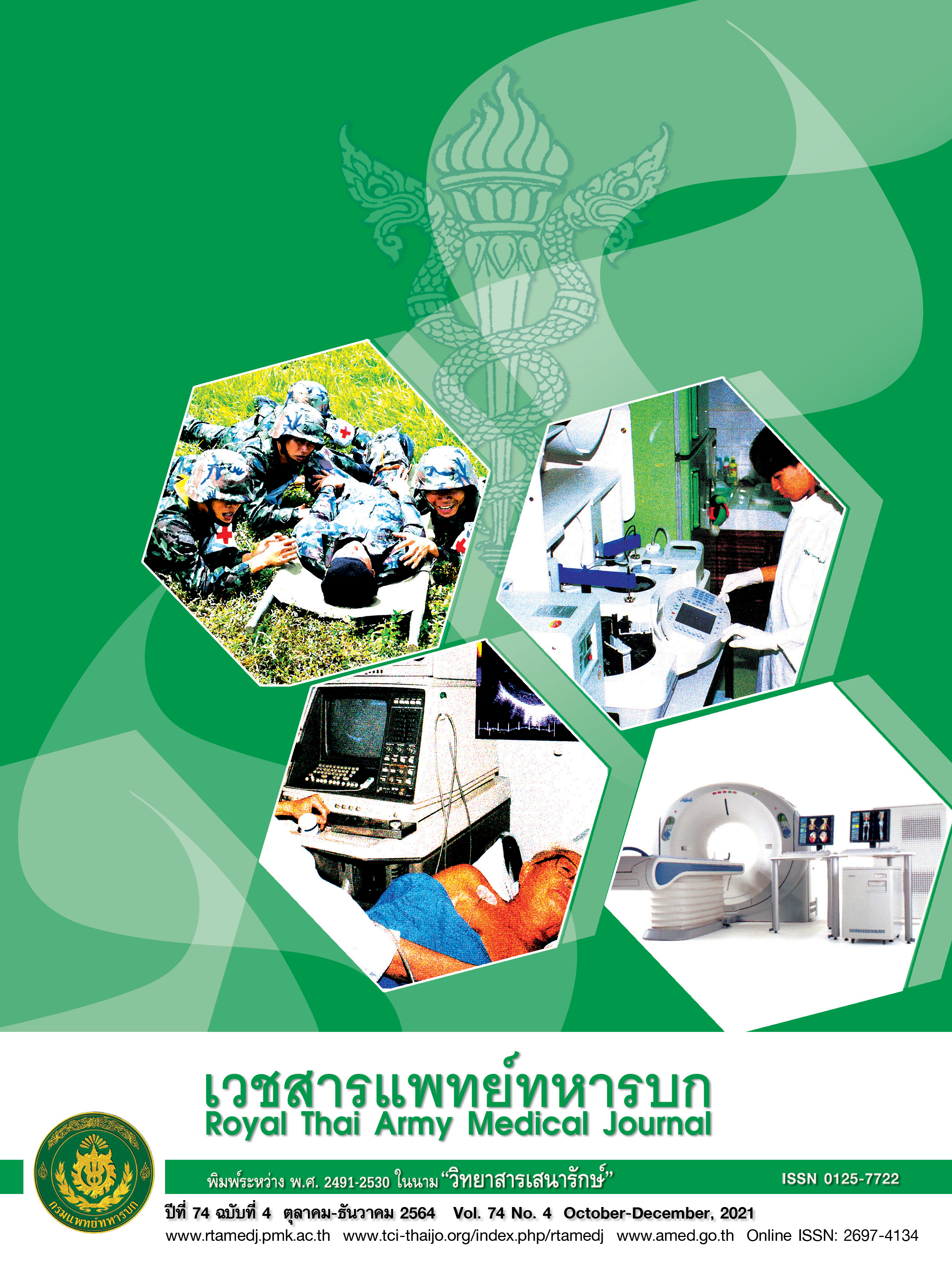โรคหลอดเลือดสมองตีบตันในทารกแรกเกิด โรคหลอดเลือดสมองตีบตันในทารกแรกเกิด
Main Article Content
บทคัดย่อ
โรคหลอดเลือดสมองในทารกแรกเกิดเป็นภาวะที่พบได้ในทารกเกิดครบกำหนด โดยผู้ป่วยมีอาการอาจมาแสดงด้วยอาการทางระบบประสาทหรือพัฒนาการที่ผิดปกติ หลังการรักษาและการฝึกฝนพัฒนาการ เมื่อติดตามผู้ป่วยไปพบว่าบางรายยังคงมีอาการทางระบบประสาทหรือพัฒนาการที่ผิดปกติ แต่ในผู้ป่วยบางรายมีอาการที่ดีขึ้นอย่างมากจนตรวจไม่พบความผิดปกติหลงเหลือเลย รายงานฉบับนี้นำเสนอผู้ป่วยเด็กหญิงที่มีอาการชักและอ่อนแรงครึ่งซีกตั้งแต่แรกเกิด โดยตรวจพบว่าเกิดจาก Middle cerebral artery stroke ผู้ป่วยได้รับการรักษาด้วยยากันชักและไม่มีอาการชักซ้ำอีก เมื่อติดตามผู้ป่วยไปพบว่ามีพัฒนาการล่าช้าในทุกด้านในช่วงแรก ผู้ป่วยได้ฝึกกายภาพบำบัดและกระตุ้นพัฒนาการอย่างสม่ำเสมอจนถึงอายุ 2 ปี เมื่อติดตามผู้ป่วยที่อายุ 3 ปีพบว่า ผู้ป่วยมีพัฒนาการดีขึ้นอย่างมาก เหลือเพียงการสื่อสารด้านภาษาล่าช้าเท่านั้น โดยความเข้าใจภาษาและพัฒนาการด้านอื่นๆอยู่ในเกณฑ์ปกติทั้งหมด รายงานฉบับนี้ยืนยันว่า โรคหลอดเลือดสมองตีบตันในวัยทารกมีพยากรณ์โรคที่ดี แม้จะเสียหายเป็นบริเวณกว้างก็ตาม
Downloads
Article Details
บทความในวารสารนี้อยู่ภายใต้ลิขสิทธิ์ของ กรมแพทย์ทหารบก และเผยแพร่ภายใต้สัญญาอนุญาต Creative Commons Attribution-NonCommercial-NoDerivatives 4.0 International (CC BY-NC-ND 4.0)
ท่านสามารถอ่านและใช้งานเพื่อวัตถุประสงค์ทางการศึกษา และทางวิชาการ เช่น การสอน การวิจัย หรือการอ้างอิง โดยต้องให้เครดิตอย่างเหมาะสมแก่ผู้เขียนและวารสาร
ห้ามใช้หรือแก้ไขบทความโดยไม่ได้รับอนุญาต
ข้อความที่ปรากฏในบทความเป็นความคิดเห็นของผู้เขียนเท่านั้น
ผู้เขียนเป็นผู้รับผิดชอบต่อเนื้อหาและความถูกต้องของบทความของตนอย่างเต็มที่
การนำบทความไปเผยแพร่ซ้ำในรูปแบบสาธารณะอื่นใด ต้องได้รับอนุญาตจากวารสาร
เอกสารอ้างอิง
1. Lynch JK, Nelson KB. Epidemiology of perinatal stroke. Curr Opin Pediatr. 2001;13(6):499-505.
2. Chabrier S, Husson B, Dinomais M, Landrieu P, Nguyen The Tich S. New insights (and new interrogations) in perinatal arterial ischemic stroke. Thromb Res. 2011;127(1):13-22.
3. Wu YW, Lynch JK, Nelson KB. Perinatal arterial stroke: understanding mechanisms and outcomes. Semin Neurol. 2005;25(4):424-34.
4. Ciccone S, Cappella M, Borgna-Pignatti C. Ischemic stroke in infants and children: practical management in emergency. Stroke Res Treat. ;2011:736965.
5. Kirton A, Deveber G. Life after perinatal stroke. Stroke. 2013;44(11):3265-71.
6. Nudo RJ. Neural bases of recovery after brain injury. J Commun Disord. 2011;44(5):515-20.
7. Kolb B, Teskey GC. Age, experience, injury, and the changing brain. Dev Psychobiol. 2012;54(3):311-25.
8. Golomb MR, deVeber GA, MacGregor DL, Domi T, Whyte H, Stephens D, et al. Independent walking after neonatal arterial ischemic stroke and sinovenous thrombosis. J Child Neurol. 2003;18(8):530-6.
9. Grunt S, Mazenauer L, Buerki SE, Boltshauser E, Mori AC, Datta AN, et al. Incidence and outcomes of symptomatic neonatal arterial ischemic stroke. Pediatrics. 2015;135(5):e1220-8.
10. Sreenan C, Bhargava R, Robertson CM. Cerebral infarction in the term newborn: clinical presentation and long-term outcome. J Pediatr. 2000;137(3):351-5.
11. Lee J, Croen LA, Lindan C, Nash KB, Yoshida CK, Ferriero DM, et al. Predictors of outcome in perinatal arterial stroke: a population-based study. Ann Neurol. 2005;58(2):303-8.
12. Mercuri E, Barnett A, Rutherford M, Guzzetta A, Haataja L, Cioni G, et al. Neonatal cerebral infarction and neuromotor outcome at school age. Pediatrics. 2004;113(1 Pt 1):95-100.
13. Nelson KB, Lynch JK. Stroke in newborn infants. Lancet Neurol. 2004;3(3):150-8.
14. Kirton A. Modeling developmental plasticity after perinatal stroke: defining central therapeutic targets in cerebral palsy. Pediatr Neurol. 2013;48(2):81-94.
15. Sakzewski L, Ziviani J, Boyd R. Systematic review and meta-analysis of therapeutic management of upper-limb dysfunction in children with congenital hemiplegia. Pediatrics. 2009;123(6):e1111-22.
16. Ricci D, Mercuri E, Barnett A, Rathbone R, Cota F, Haataja L, et al. Cognitive outcome at early school age in term-born children with perinatally acquired middle cerebral artery territory infarction. Stroke. 2008;39(2):403-10.
17. McLinden A, Baird AD, Westmacott R, Anderson PE, deVeber G. Early cognitive outcome after neonatal stroke. J Child Neurol. 2007;22(9):1111-6.
18. Muter V, Taylor S, Vargha-Khadem F. A longitudinal study of early intellectual development in hemiplegic children. Neuropsychologia. 1997;35(3):289-98.
19. Ballantyne AO, Spilkin AM, Hesselink J, Trauner DA. Plasticity in the developing brain: intellectual, language and academic functions in children with ischaemic perinatal stroke. Brain. 2008;131(Pt 11):2975-85.
20. Westmacott R, MacGregor D, Askalan R, deVeber G. Late emergence of cognitive deficits after unilateral neonatal stroke. Stroke. 2009;40(6):2012-9.
21. Levine SC, Kraus R, Alexander E, Suriyakham LW, Huttenlocher PR. IQ decline following early unilateral brain injury: a longitudinal study. Brain Cogn. 2005;59(2):114-23.
22. Armstrong-Wells J, Ferriero DM. Diagnosis and acute management of perinatal arterial ischemic stroke. Neurol Clin Pract. 2014;4(5):378-85.
23. Chilosi AM, Cipriani P, Pecini C, Brizzolara D, Biagi L, Montanaro D, et al. Acquired focal brain lesions in childhood: effects on development and reorganization of language. Brain Lang. 2008;106(3):211-25.
24. Reilly JS, Wasserman S, Appelbaum M. Later language development in narratives in children with perinatal stroke. Dev Sci. 2013;16(1):67-83.
25. Liégeois F, Connelly A, Cross JH, Boyd SG, Gadian DG, Vargha-Khadem F, et al. Language reorganization in children with early-onset lesions of the left hemisphere: an fMRI study. Brain. 2004;127(Pt 6):1229-36.
26. van Dongen HR, Paquier PF, Creten WL, van Borsel J, Catsman-Berrevoets CE. Clinical evaluation of conversational speech fluency in the acute phase of acquired childhood aphasia: does a fluency/nonfluency dichotomy exist? J Child Neurol. 2001;16(5):345-51.
27. Paquier PF, Van Dongen HR. Review of research on the clinical presentation of acquired childhood aphasia. Acta Neurol Scand. 1996;93(6):428-36.
28. Raja Beharelle A, Dick AS, Josse G, Solodkin A, Huttenlocher PR, Levine SC, et al. Left hemisphere regions are critical for language in the face of early left focal brain injury. Brain : a journal of neurology. 2010;133(Pt 6):1707-16.
29. Guzzetta A, Pecini C, Biagi L, Tosetti M, Brizzolara D, Chilosi A, et al. Language organisation in left perinatal stroke. Neuropediatrics. 2008;39(3):157-63.
30. Rapin I. Acquired aphasia in children. J Child Neurol. 1995;10(4):267-70.


